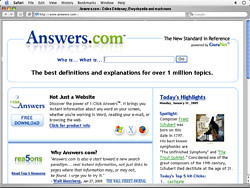A New Search Paradigm: Real Instant Information vs Links To Pages


Answers.com is a start to a new search paradigm. I haven't use it for a while, but thanks to Walt S Mossberg he brought it back to my mind to try it again.
Mossberg has recently reviewed answers.com in the Wall Street Journal, and found a lot to like.
In an article run by WSJ on January 27, 2005, entitled Unlike Search Engines, Answers.Com Responds With Data, Not Links, Walt S Mossberg mentions:
For all of their popularity and importance, search services like Google have a significant limitation:
They don't answer questions or provide information directly. If you want to know the biography of a historical figure, the meaning of a word or the size of a city, Google and its competitors usually won't simply tell you. Instead, they will generate a list of Web sites where the answers might -- or might not -- be found...
Answers.com is also a start toward a new search paradigm where the object is to provide real instant information, not just links to pages where that information may, or may not, be found. I urge you to try it.
To be continued here.








